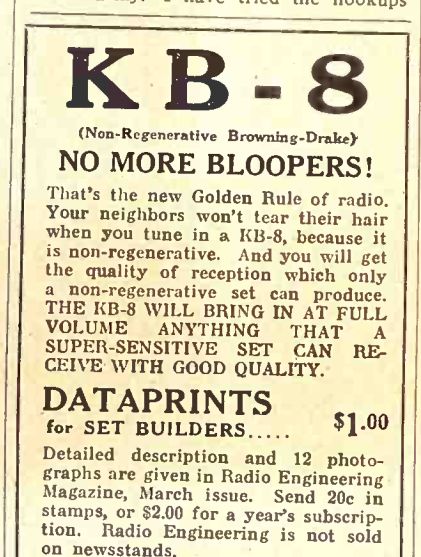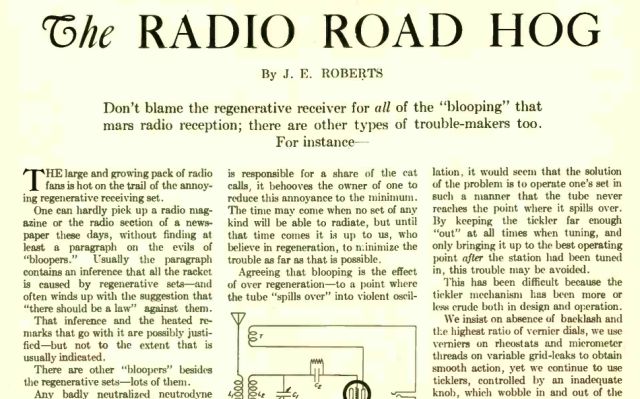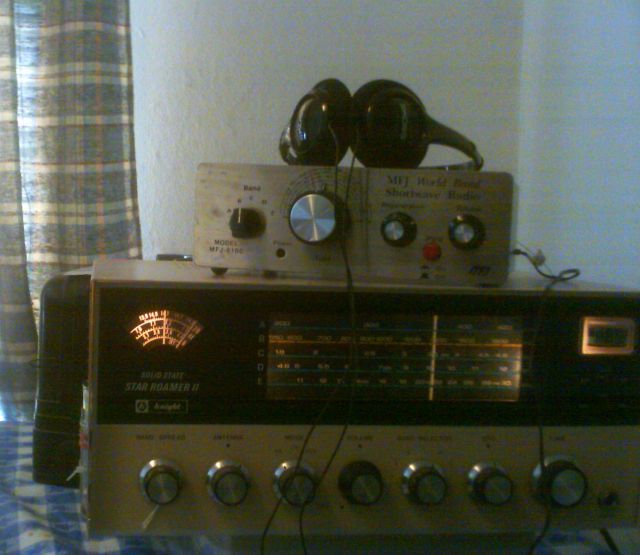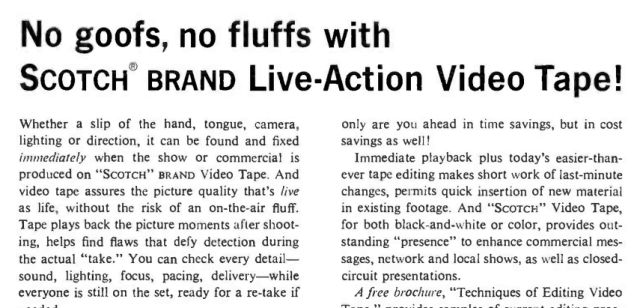Tuesday, April 11, 2017
Who's the blooper?
More from Radio World, 1926:
 This makes sense as a plausible origin of the word. A regenerative receiver oscillates powerfully, and the oscillation can radiate from the antenna. When you tune across the frequency that your neighbor is trying to pick up, your neighbor hears a BLOOP.
During the publicity campaign for superhets, blooper could refer to the experience of being blooped, or the regen receiver itself, or the socially unacceptable owner of a regen receiver. "Don't be a blooper!"
A more objective view of the squabble from here:
This makes sense as a plausible origin of the word. A regenerative receiver oscillates powerfully, and the oscillation can radiate from the antenna. When you tune across the frequency that your neighbor is trying to pick up, your neighbor hears a BLOOP.
During the publicity campaign for superhets, blooper could refer to the experience of being blooped, or the regen receiver itself, or the socially unacceptable owner of a regen receiver. "Don't be a blooper!"
A more objective view of the squabble from here:
 I'm suspicious of the advertising claim because I tested it. I have a kit-built regen and a 1970s superhet.
I'm suspicious of the advertising claim because I tested it. I have a kit-built regen and a 1970s superhet.
 Can't hardly get more neighborly. They're practically screwing. So who bloops? Superhet bloops.
When I turn the volume up on the superhet and tune the regen across the band, I don't hear anything on the superhet. When I turn up the volume on the regen and tune the superhet across the band, I hear a strong bloop in the regen's earphones as the superhet's LO crosses the regen's freq. Maybe this cute regen is superior to the 1920's regens, but I doubt it. This is a simple circuit with very little shielding.
But when did the word switch from a literal blooping sound to a speech error? The switch happened MUCH later, long after the original had been forgotten. Speech errors were called fluffs well into the '60s:
Can't hardly get more neighborly. They're practically screwing. So who bloops? Superhet bloops.
When I turn the volume up on the superhet and tune the regen across the band, I don't hear anything on the superhet. When I turn up the volume on the regen and tune the superhet across the band, I hear a strong bloop in the regen's earphones as the superhet's LO crosses the regen's freq. Maybe this cute regen is superior to the 1920's regens, but I doubt it. This is a simple circuit with very little shielding.
But when did the word switch from a literal blooping sound to a speech error? The switch happened MUCH later, long after the original had been forgotten. Speech errors were called fluffs well into the '60s:
 I wonder if the word transferred first to baseball and then to speech errors? That would fit the time pattern, but seems unlikely since the literal tone-sweep and the figurative speech error are both in broadcasting.
I wonder if the word transferred first to baseball and then to speech errors? That would fit the time pattern, but seems unlikely since the literal tone-sweep and the figurative speech error are both in broadcasting.
 This makes sense as a plausible origin of the word. A regenerative receiver oscillates powerfully, and the oscillation can radiate from the antenna. When you tune across the frequency that your neighbor is trying to pick up, your neighbor hears a BLOOP.
During the publicity campaign for superhets, blooper could refer to the experience of being blooped, or the regen receiver itself, or the socially unacceptable owner of a regen receiver. "Don't be a blooper!"
A more objective view of the squabble from here:
This makes sense as a plausible origin of the word. A regenerative receiver oscillates powerfully, and the oscillation can radiate from the antenna. When you tune across the frequency that your neighbor is trying to pick up, your neighbor hears a BLOOP.
During the publicity campaign for superhets, blooper could refer to the experience of being blooped, or the regen receiver itself, or the socially unacceptable owner of a regen receiver. "Don't be a blooper!"
A more objective view of the squabble from here:
 I'm suspicious of the advertising claim because I tested it. I have a kit-built regen and a 1970s superhet.
I'm suspicious of the advertising claim because I tested it. I have a kit-built regen and a 1970s superhet.
 Can't hardly get more neighborly. They're practically screwing. So who bloops? Superhet bloops.
When I turn the volume up on the superhet and tune the regen across the band, I don't hear anything on the superhet. When I turn up the volume on the regen and tune the superhet across the band, I hear a strong bloop in the regen's earphones as the superhet's LO crosses the regen's freq. Maybe this cute regen is superior to the 1920's regens, but I doubt it. This is a simple circuit with very little shielding.
But when did the word switch from a literal blooping sound to a speech error? The switch happened MUCH later, long after the original had been forgotten. Speech errors were called fluffs well into the '60s:
Can't hardly get more neighborly. They're practically screwing. So who bloops? Superhet bloops.
When I turn the volume up on the superhet and tune the regen across the band, I don't hear anything on the superhet. When I turn up the volume on the regen and tune the superhet across the band, I hear a strong bloop in the regen's earphones as the superhet's LO crosses the regen's freq. Maybe this cute regen is superior to the 1920's regens, but I doubt it. This is a simple circuit with very little shielding.
But when did the word switch from a literal blooping sound to a speech error? The switch happened MUCH later, long after the original had been forgotten. Speech errors were called fluffs well into the '60s:
 I wonder if the word transferred first to baseball and then to speech errors? That would fit the time pattern, but seems unlikely since the literal tone-sweep and the figurative speech error are both in broadcasting.
I wonder if the word transferred first to baseball and then to speech errors? That would fit the time pattern, but seems unlikely since the literal tone-sweep and the figurative speech error are both in broadcasting.Labels: Asked and sort of answered, Patient things
